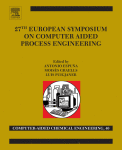 Authors: Carlos A. MUNOZ, Dries TELEN, Philippe NIMMEGEERS, Lorenzo CABIANCA, Filip LOGIST, Jan Van IMPE
Authors: Carlos A. MUNOZ, Dries TELEN, Philippe NIMMEGEERS, Lorenzo CABIANCA, Filip LOGIST, Jan Van IMPE
Affiliation: KU Leuven, Department of Chemical Engineering, BioTeC+, Gebroeders De Smetstraat 1, B-9000 Gent, Belgium
Reference (APA): Muñoz, C. A., Telen, D., Nimmegeers, P., Cabianca, L., Logist, F., & Van Impe, J. (2017). Investigating practical aspects of the exergy based multi-objective optimization of chemical processes. In Computer Aided Chemical Engineering (Vol. 40, pp. 2173–2178). Elsevier B.V. https://doi.org/10.1016/B978-0-444-63965-3.50364-0
Abstract: “When optimizing chemical processes, conflicting objectives are often present (Logist et al, 2011). In industry, the trend towards sustainable development highlights this challenge because it encompasses three pillars: economy, society, and environment. A common example is the search for higher profitability while improving the safety of operation and reducing the energy consumption. In this framework, the exergy concept is highly relevant since it is understood as the confluence of energy, environment, and sustainable development (Rosen and Dincer, 2001). This contribution presents a novel approach to exploit the synergies of the exergy analysis and the gradient-based multi-objective optimization (MOO) of processes. An interface with Aspen Plus has been developed to exploit the added value of this approach, aiming to minimize the lost work in the context of conflicting objectives. The interface links the process simulator to Matlab, which is used as platform to run CasADi, a symbolic framework for algorithmic differentiation and numerical optimization (Andersson, 2013)…”
Comment: the authors are describing three classes of approach to address complex optimization problems based on process simulations. Optimization accessing the Equation Set Object or its equivalent is listed as the third approach. Their work presents an alternative approach to previous works that have exploited simulators supporting the Equation Set Object standard such as the work of Lang and Biegler at Carnegie Mellon University who made IPOPT a CAPE-OPEN MINLP Process Modelling Component. In their conclusion, they are stating “The versatility of the interface to apply gradient-based optimization to models that consist of ESO and user defined algebraic equations has successfully been exploited to minimize the process lost work.”
